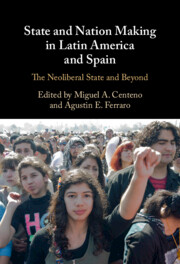Book contents
- State and Nation Making in Latin America and Spain
- State and Nation Making in Latin America and Spain
- Copyright page
- Dedication
- Contents
- Notes on Contributors
- Preface
- Part I Introduction
- Part II Economic and Territorial Power
- Part III Infrastructural Power: Reform Strategies
- 6 Two Roads of Neoliberal Reform in Higher Education
- 7 Reinvented Governments in Latin America
- 8 The Devil Hides in the Details
- 9 Neoliberal Reform of Transport Institutions in Brazil, Argentina, and Chile
- 10 The End Game of Social Policy in a Context of Enduring Inequalities
- Part IV Symbolic Power: Identities and Social Protest
- Part V Conclusions
- Index
- References
8 - The Devil Hides in the Details
Variations of Conditional Cash Transfers Programs in Latin America*
from Part III - Infrastructural Power: Reform Strategies
Published online by Cambridge University Press: 03 August 2023
- State and Nation Making in Latin America and Spain
- State and Nation Making in Latin America and Spain
- Copyright page
- Dedication
- Contents
- Notes on Contributors
- Preface
- Part I Introduction
- Part II Economic and Territorial Power
- Part III Infrastructural Power: Reform Strategies
- 6 Two Roads of Neoliberal Reform in Higher Education
- 7 Reinvented Governments in Latin America
- 8 The Devil Hides in the Details
- 9 Neoliberal Reform of Transport Institutions in Brazil, Argentina, and Chile
- 10 The End Game of Social Policy in a Context of Enduring Inequalities
- Part IV Symbolic Power: Identities and Social Protest
- Part V Conclusions
- Index
- References
Summary
This chapter takes the case of Conditional Cash Transfer programs (CCTs) as an invitation to examine a trade-off faced by many Latin American neoliberal states: Their promise of making states both more efficient and more inclusive. More specifically, I use the case of CCTs to explore variations in how the Brazilian and Mexican states understood and acted on the promise of increasing inclusivity in official safety nets by making poverty management more efficient. I argue that while Brazil and Mexico equally chose CCTs as their main strategy to reinvent social policy provision for low-income families in a neoliberal era, they did so for different reasons, which resulted in the implementation of programs that followed distinct operational logic. In Mexico, the state invested in a very precise regime to select and monitor low-income families, while Brazil adopted a looser strategy. These differences depended on the strategies of legitimation of each CCT and were influenced by the distinct approaches to neoliberalism adopted by each country. My findings are based on analyzing a rich set of qualitative data, including the study of official documents and 100 in-depth interviews with political and bureaucratic elites in the two countries.
- Type
- Chapter
- Information
- State and Nation Making in Latin America and SpainThe Neoliberal State and Beyond, pp. 269 - 288Publisher: Cambridge University PressPrint publication year: 2023



